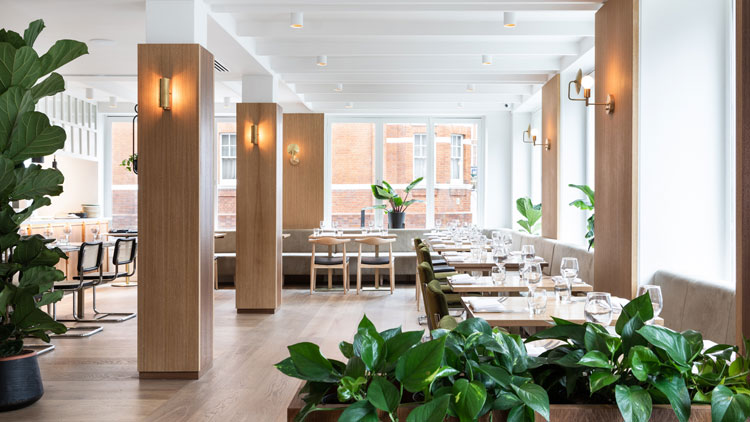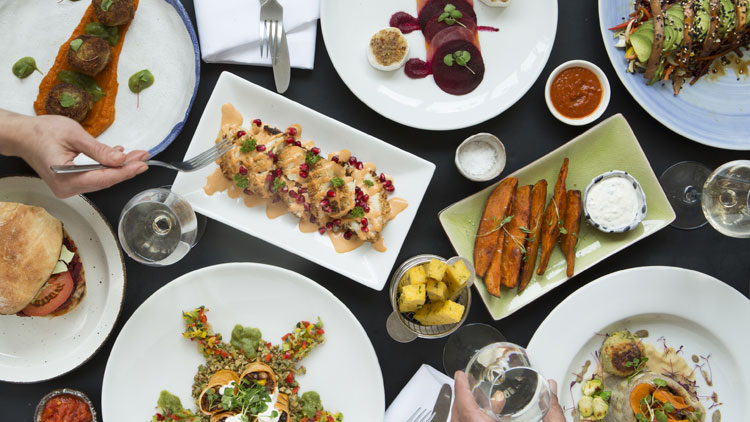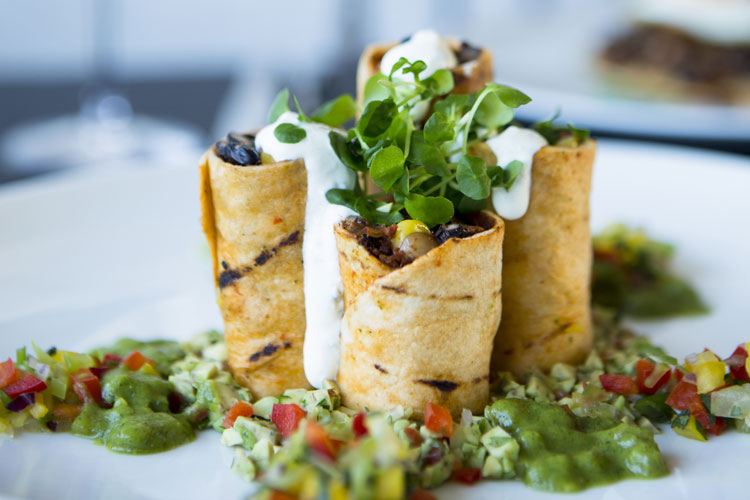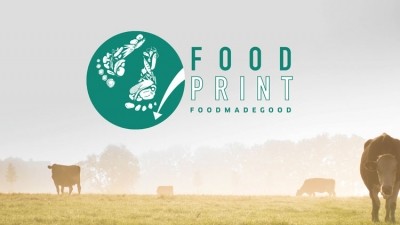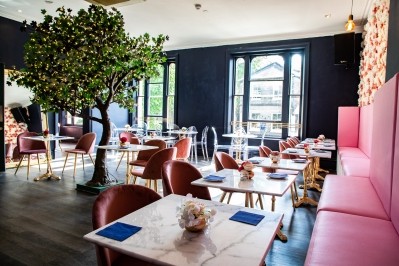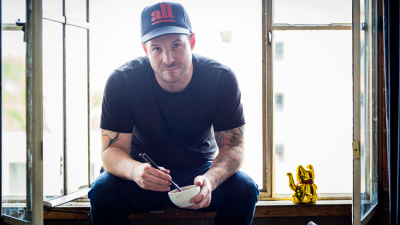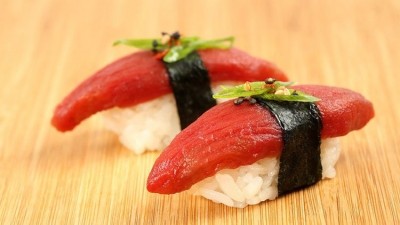The gate keeper: Michael Daniel on his restaurant group turning 30
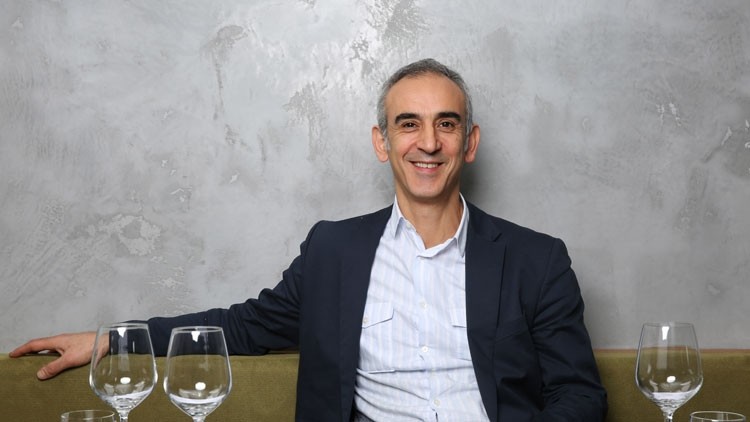
In today’s fast-paced restaurant sector, where trends seemingly come out of nowhere and then evaporate just as quickly (remember unicorn bagels, freakshakes, gourmet hot dogs?) it’s often hard to play the long game. But that’s exactly what vegetarian restaurant group The Gate has done. With four London restaurants, the group has suddenly found itself at the centre of the plant-based movement currently sweeping the UK: and it’s only been 30 years in the making.
Launched in Hammersmith back in 1989, the history of The Gate is really a two-parter. For the first 23 years it operated as a single, successful restaurant, and it has only been in the past seven years it has grown to the four sites it occupies today, the most recent having opened in April this year. It may well have remained as a single entity had it not been forced to close for a year for the landlord to carry out refurbishment work on the property, a situation co-founder and managing director Michael Daniel says unwittingly kickstarted the growth of the group.
Now in his 50s, Daniel opened The Gate with his brother Adrian when he was just 22 years old (his brother is three years his elder) at a time when vegetarian food in restaurants was still a very niche concept. “It was still the cliché that vegetarians were of the sandal-wearing brigade at the time,” says Daniel as we chat in his smart St John’s Wood restaurant, the latest addition to The Gate’s portfolio. “Thirty years ago, the vegetarian scene was very different.”
Ahead of the curve
This is no understatement. The UK might now be in the grips of the plant-based revolution, with the number of people following a vegetarian or vegan diet rising at a meteoric pace and restaurants responding in kind, but in the 1990s it was still a very much under-served category. Vegetarian restaurant group Cranks had been operating for two decades previously and vegetarianism was on the rise but, in general, restaurants were still very much of a meat-led mindset.
Nevertheless, the story of The Gate’s birth is one that will resonate with many street food-turned-restaurant operators today. Daniel and his brother had no knowledge of cooking or of food – he says he rarely went out to eat as a child – but as vegetarians and seeing a gap in the market for a vegetarian restaurant, they decided to give it a go anyway.
“I didn’t really know anything about cooking or about business, I just liked food. And yeah, we could cook,” says Daniel. “We’d done a hodgepodge kind of thing at Glastonbury about six months before where we made a couple of hundred quid, so we thought ‘why not?’. And then my brother found a site in Hammersmith, so we took the lease and we just started cooking. It was a lot of trial and error and it developed very slowly from there.”
Called The Gate in reference to the gate you need to go through to access the restaurant, their debut venture is tucked away just south of the Hammersmith flyover in a place Daniel admits isn’t the most obvious or accessible, but at the time was a sensible move. “In a funny way we chose it because it was so out of the way. It became a place where we could learn without being bombarded with customers.”
This might seem like a foolhardy tactic in today’s climate, but it paid dividends back then, with the brothers building slowly a restaurant that would have enviable longevity – although this is something Daniel plays down. “In the early 90s there was a bit of a ‘food revolution’ in London and there was a buzz in Hammersmith that we got swept up in, even if it wasn’t our cultural reference. Jamie [Oliver] was at The River Café, for example, and people used to walk in and ask, ‘have you seen Jamie?’. What kept us going in the beginning was that there were lots of offices and music companies, and they used to give their employees Luncheon Vouchers. And we were very cheap in the beginning – £1.50 for a starter to £2.50 for a main. It was happy cheap food if you like. Yeah. Honest food. I’ve done it on the back of making a living and not taking big risks.”
The path to growth
This is clearly no longer the case. Daniel freely admits that The Gate’s offer today is a world away from its early cheap days and says the quality of the food and cooking is reflected in its prices. Starters average £8 and mains range from £13.50 to £16, with sides at £4. The menu is still international but has evolved to reflect changing tastes and access to new ingredients, with dishes such as courgette flowers with homemade ricotta; potato chaat; miso-glazed aubergine; green Thai curry; and wild mushroom risotto cake.
Daniel is also no longer the risk-averse restaurateur of old, having opened restaurants in Islington, Marylebone and St John’s Wood over the past seven years. Strangely, what eventually proved to be the catalyst for this expansion almost killed the restaurant off, with The Gate forced to close for refurbishment and Daniel considering at that point calling it a day. “I was really considering letting it all go and doing something else,” he says. “I’d been doing it for 23 years and I wasn’t sure I wanted to do it any more. But people who had been coming in for many, many years kept telling me how much they loved The Gate. That’s what spurred me on to keep it going.”
So, in June 2012, in the belief that Hammersmith would be closed for a few months, he kept the brand alive by opening a restaurant in Islington. Hammersmith subsequently wouldn’t reopen for another year, and while at the time this caused great frustration and annoyance, in hindsight he says it gave him the breathing space required to get Islington established.
The move from Hammersmith to Islington was quite a jump, both geographically and mentally: The Gate’s Hammersmith rent and rates were £25,000 a year at the time but in Islington the figure was four times that. Nevertheless, Daniel stayed true to the original offer of creating a menu of universal appeal rather than one squarely aimed at vegetarians. “I was still stuck with this belief that 50% of my customers weren’t vegetarians. And that’s something that has spurred me on to believe that it was never just about vegetarians. It’s popular with the theatre-going crowd and people looking to cut down on their meat consumption, as well as vegans and vegetarians.”
Daniel evidently caught the expansion bug. Hammersmith reopened in 2013, with Marylebone’s Seymour Place following in 2016 and St John’s Wood this year. “It’s all about belief, isn’t it? If you believe that you can grow, and you can offer more, then why not give it a go?”
Working the plant-based boom
With the plant-based revolution now in full swing, and with The Gate having established itself as somewhere as suited to meat-reducers as hard-core vegetarians and vegans, Daniel looks to be in a good place. Yet, the changing plant-based landscape, and indeed that of the casual dining scene, means The Gate is experiencing similar pressures to many others in the sector.
“We started the year in January projecting 5% growth, but now we’re in a situation where we’ll be happy with either staying the same or just 1% growth. It’s tough out there. I get alerts when new sites come on the market and they are more frequent than ever before. Until Brexit is over and some deal is done, it will remain tough. You can talk to anyone in the industry on the phone and the last thing they’ll say to you is ‘have you got any chefs?’ But we’re holding our own.”
The new plant-based movement has also brought challenges as well as opportunities. While The Gate has history on its side, some of the newer entrants into the category have used their newness to create buzz and have also been able to latch onto the latest trends. As such, while many new entrants, most notably places such as US import By Chloe, Vurger, Halo Burger, Temple of Seitan, Biff’s Jack Shack, Farmacy and Club Mexicana, appeal to millennials, The Gate’s customer demographic is older.
“I’m not 100% sure where The Gate sits, because there are all these sub-cultures now. The new vegetarian and vegan revolution uses a lot of highly processed food. We try to stay away from things like that. We do have a burger on the menu these days, but that’s about it.”
The plant-based moment has also brought previously protein-focused restaurants into The Gate’s competitive sphere. “Now you can go to almost any restaurant and 10% or 20% of the menu is vegan. That’s a challenge. Some places will do it well but in others it won’t be as good.”
The greater acceptance of animal protein-free dishes is undeniably a positive, and Daniel is keen to ensure The Gate capitalises on it. At the start of the year the company changed its strapline to ‘plant-based pioneers since 1989’, not only to use the current parlance but to highlight that it isn’t just another upstart jumping on the meat-free bandwagon.
There are other challenges Daniel needs to overcome. He says he is desperate for outside space at the St John’s Wood restaurant because of the area’s “very continental” dining scene, and that his restaurants need to keep evolving to keep apace of the continually changing dining scene where restaurants are moving beyond being just a lunch and dinner option but more an all-day offer. “We might try to tackle that to some degree. We need to change the vibe a little to be a bit more attractive to certain people. There is a different expectation now of what a restaurant is – just look
at somewhere like Granger & Co. that trades all day. But you can’t just rip up a long-term plan, you need to think carefully about what’s right for your business. There are all sorts of dynamics going on.”
As a nod to this, there are slight variations in the offers at the restaurants. A weekend brunch is served at St John’s Wood and Marylebone, with St John’s Wood also serving breakfast. Hammersmith, meanwhile, serves a Sunday roast.
As to whether there will be any more restaurants, Daniel is both optimistic and realistic about where the plant-based boom could take him. “If there’s potential to grow and The Gates are doing well, I will look at others,” he says. “But we need to get through this year and Brexit first.
“When people talk about expansion, they talk about cities like Cambridge, Oxford and Bristol. But you can’t take something that you know works in one place and just replicate it. We need to be careful.”
This is a web version of an article that first appeared in the August issue of Restaurant magazine, the leading title for the UK's restaurant industry. For more features, comment, interviews and in-depth analysis of the restaurant sector subscribe to Restaurant magazine here.
